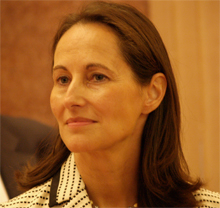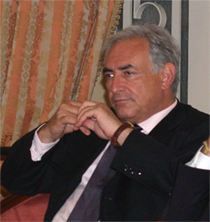D-Day, Day D, D-minus a few hours: on Thursday, November 16, Socialist Party members will choose their candidate with 218,771 ballots in an election open from 4:00 PM in all PS sections, totaling 4,000 polling stations. The election is a two-round majority vote with blank ballots being counted. If none of the candidates reaches 50%, the second round will take place on November 23.
 Ségolène Royal likens the Socialist primaries to a first round of the Presidential elections against the Right. Given the length of the campaign, she’s not wrong. Just like with the exposure. The internal vote and its debates have made headlines since the summer. Enough to be exhausted and even run out of arguments. Nicolas Sarkozy is rubbing his hands and Thierry Solère, head of the UMP Blogs, confirms it in an article in Le Monde dated November 15: “He often says it. The ideal is a weakened Ségolène Royal.” Between the escalation of ideas and responses to attacks, one wonders if the chosen candidate will emerge unscathed, without scars and without wounds.
Ségolène Royal likens the Socialist primaries to a first round of the Presidential elections against the Right. Given the length of the campaign, she’s not wrong. Just like with the exposure. The internal vote and its debates have made headlines since the summer. Enough to be exhausted and even run out of arguments. Nicolas Sarkozy is rubbing his hands and Thierry Solère, head of the UMP Blogs, confirms it in an article in Le Monde dated November 15: “He often says it. The ideal is a weakened Ségolène Royal.” Between the escalation of ideas and responses to attacks, one wonders if the chosen candidate will emerge unscathed, without scars and without wounds.
 After November 23 (or the 16th), differences will have to come together to make the Socialist candidate the representative of all Socialists. The pieces of the puzzle will have to come together to form a uniform whole. It’s not going to be easy and today it’s hard to imagine. François Hollande, the first secretary, declared that he will lead the campaign alongside the chosen candidate of his supporters: “We cannot do without any sensibility, any skill, any personality. It is my job to ensure this. The time is not for sanctions, it’s for unity and voting. Democracy is the most beautiful discipline.” Democratic camaraderie certainly allows for the dissemination of harmful videos of her rival that will leave scars for the Great Campaign, the one in the spring. Democratic camaraderie also allows for portraying rivals as the most chauvinistic of the French.
After November 23 (or the 16th), differences will have to come together to make the Socialist candidate the representative of all Socialists. The pieces of the puzzle will have to come together to form a uniform whole. It’s not going to be easy and today it’s hard to imagine. François Hollande, the first secretary, declared that he will lead the campaign alongside the chosen candidate of his supporters: “We cannot do without any sensibility, any skill, any personality. It is my job to ensure this. The time is not for sanctions, it’s for unity and voting. Democracy is the most beautiful discipline.” Democratic camaraderie certainly allows for the dissemination of harmful videos of her rival that will leave scars for the Great Campaign, the one in the spring. Democratic camaraderie also allows for portraying rivals as the most chauvinistic of the French.
 On the local level, Nathalie Audin, a supporter of DSK, defended her favorite but in our columns did not hesitate to criticize Ségolène Royal: “We mostly stayed within the realm of observations and in a kind of mirror reflecting the supposed expectations of the public.” Olivier Tafanelli, a supporter of Ségolène Royal, “fears that overall the French might remember these debates as mainly being exploited by DSK and FABIUS to try to discredit Ségolène Royal.” Dominique Boy-Mottard, a supporter of Laurent Fabius acknowledges: “No matter which candidate one chooses, everyone has a part of subjectivity on this point. So it will surely be my case as well, inevitably…” and highlights: “two candidates showed themselves to be very different from the third, accepting to answer questions truly on the substance, thus proving their competence on most of the issues discussed (which is probably normal given their experience in high responsibility positions). Ségolène Royal seemed nervous, not always very comfortable (refusing to answer questions) and even appeared aggressive at times.”
On the local level, Nathalie Audin, a supporter of DSK, defended her favorite but in our columns did not hesitate to criticize Ségolène Royal: “We mostly stayed within the realm of observations and in a kind of mirror reflecting the supposed expectations of the public.” Olivier Tafanelli, a supporter of Ségolène Royal, “fears that overall the French might remember these debates as mainly being exploited by DSK and FABIUS to try to discredit Ségolène Royal.” Dominique Boy-Mottard, a supporter of Laurent Fabius acknowledges: “No matter which candidate one chooses, everyone has a part of subjectivity on this point. So it will surely be my case as well, inevitably…” and highlights: “two candidates showed themselves to be very different from the third, accepting to answer questions truly on the substance, thus proving their competence on most of the issues discussed (which is probably normal given their experience in high responsibility positions). Ségolène Royal seemed nervous, not always very comfortable (refusing to answer questions) and even appeared aggressive at times.”  Nonetheless, they will all support the same Socialist candidate, the same project. Their political common sense will, as if by magic, resurface to seal a union and fill the cracks within the Socialist Party for the Presidential and legislative elections.
Nonetheless, they will all support the same Socialist candidate, the same project. Their political common sense will, as if by magic, resurface to seal a union and fill the cracks within the Socialist Party for the Presidential and legislative elections.
But what about the members? Many of the 70,000 new members joined during the wave of popularity of the president of Poitou-Charentes, while others took advantage of the 20€ membership available directly online. It is difficult to know if the 6 debates and the campaign have lessened their enthusiasm. François Hollande predicts an 80% participation rate. Anything less would be a partial failure for the PS, as well as a high number of blank votes.


